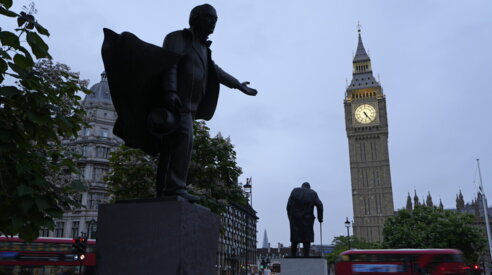The Nazis did indeed arrive in Britain. A forgotten story.


LaPresse
Anonymous English
In the film “Ghosts of Alderney”, Piers Secunda tells a forgotten episode of the Second World War: it is true that the country did not capitulate, that London resisted, that it won the war, but it is not true that England was never invaded by Hitler.
On the same topic:
In early June 1940, the Great Britain of the newly appointed Prime Minister Winston Churchill is grappling with a less than honorable retreat from Dunkirk, a city on the French coast where British troops sent to aid Europe in Hitler's hands are massed. The Germans have unexpectedly broken through the defensive lines and are about to take all of France. Churchill thinks it best to bring those soldiers home: they will be more useful in the event of a Nazi invasion of Great Britain, which is believed to be imminent. The story of Dunkirk, with civilians using their boats to fetch British soldiers under the machine guns of the Luftwaffe, is such a courageous piece of World War II history that it even made an Oscar-winning film about it. There is another piece of history, however, near Dunkirk, without any glory and which was actually purposely erased by the British. A few weeks later, with northern France lost, six Royal Navy ships landed in the small port of Lilliputian Alderney – little more than a rock in the English Channel – to evacuate the 1,500 British citizens living on the island, part of the Channel Islands, a British territory in all respects, although closer to France than to the motherland: they had been warned only a few hours before packing their bags.
With its inhabitants fleeing, Alderney was occupied by the Nazis: it was the only Channel Island to suffer that fate, the only corner of Great Britain to be occupied by the Nazis. No one knew that during the war, Germany also conquered English soil, and not only that: it also set up, as a mockery, a concentration camp, in the heart of that country that had alone opposed the Third Reich. For five years, the story of tiny and unknown Alderney was the story of Nazi brutality. While Churchill, in the War Cabinet, thundered against those who wanted to negotiate with the tiger, while their heads were in its jaws, and called on the country to fight on every beach and in every street, Great Britain itself tolerated the shame of thousands of Jews suffering unspeakable pain and being exterminated on its soil: of the 67,000 Jews deported from France, 5,000 were transferred to the islet of Alderney. They were held in four labor camps, where the prisoners built equipment for a possible attack on Great Britain—a plan always supported by Hitler. And then, in the final phase, defensive structures against a possible Allied invasion (as it actually was, but on the beaches of Normandy). There was also another camp, in Alderney, which was not a labor camp, and which had been run by the SS since 1943: the Lager Sylt was a true concentration camp. Alderney was the Auschwitz of England. Although no traces of gas chambers like those in Poland have ever been found, the numbers are holocaust-like: more than a thousand people were killed, one in five prisoners did not survive. Living conditions were inhumane, with hunger and cold: many prisoners were sick and there were no doctors.
Every day, someone died of starvation. As if that weren't enough, the cruelty of Otto Hoegelow, the major in charge of the island, reached unspeakable heights: anyone caught stealing potatoes, a desperate act of hunger, was executed. The corpses were then hung upside down as targets to alleviate the boredom of the German soldiers stationed there: they aimed for the head. The Nazis placed shards of glass into the prisoners' already meager food rations to torture them. Many bodies were loaded onto trucks and then thrown off a cliff. Others were dumped in mass graves. All these atrocities came to light only on May 9, 1945: almost a year after Eisenhower and Montgomery's troops landed in Normandy, the soldiers, with enormous delay, also liberated the British Channel Islands, which were just a stone's throw from the site of D-Day. British Captain Theodore Pantcheff, one of the first to land on Alderney, compiled a report entitled "Atrocities Committed from 1942 to 1945." Not only was the report never published, it was also suppressed: there is no trace of it in Britain. Its existence is known because, by chance, in 1995, a copy, the only existing one, was found in an archive in Moscow: the Russians knew of the camp's existence.
Britain's shrouded silence is easy to understand: Alderney is a stain on the country's history, poisoning the narrative of a country that was the only one to stand up to Nazi madness, a bastion of democracy and freedom. It's true that the country didn't capitulate, that London resisted, that it won the war, but it's not true that Britain was never invaded by Hitler. Germany took a piece of the country, albeit tiny, insignificant, and remote, and, as a mockery of the British, built the Reich's most remote concentration camp there. And for which no one has ever been charged, nor has any government ever filed a complaint. Years ago, there was a public inquiry, conducted by Baron Pickles, a member of the House of Lords, but that too was buried. Now the story is finding new life thanks to a feature-length film by historian, activist, and artist Piers Secunda: he has spent the last few years filming a documentary on the island, still an inaccessible place today, gathering evidence and testimonies of the Nazi massacre. The result is “Ghosts of Alderney,” a nearly two-hour film that watches like a Netflix docuseries but hits you in the gut like a horror movie.
More on these topics:
ilmanifesto





